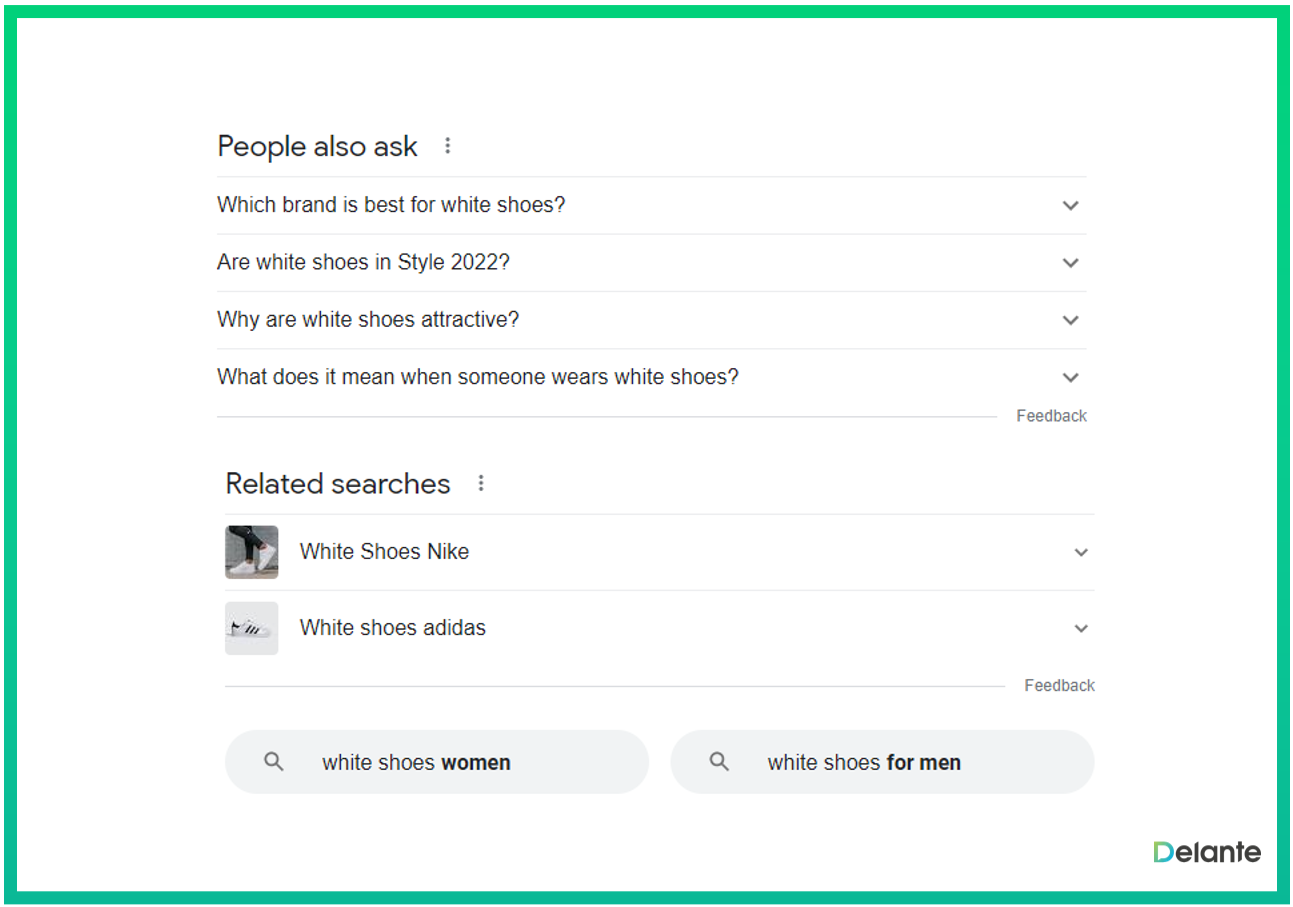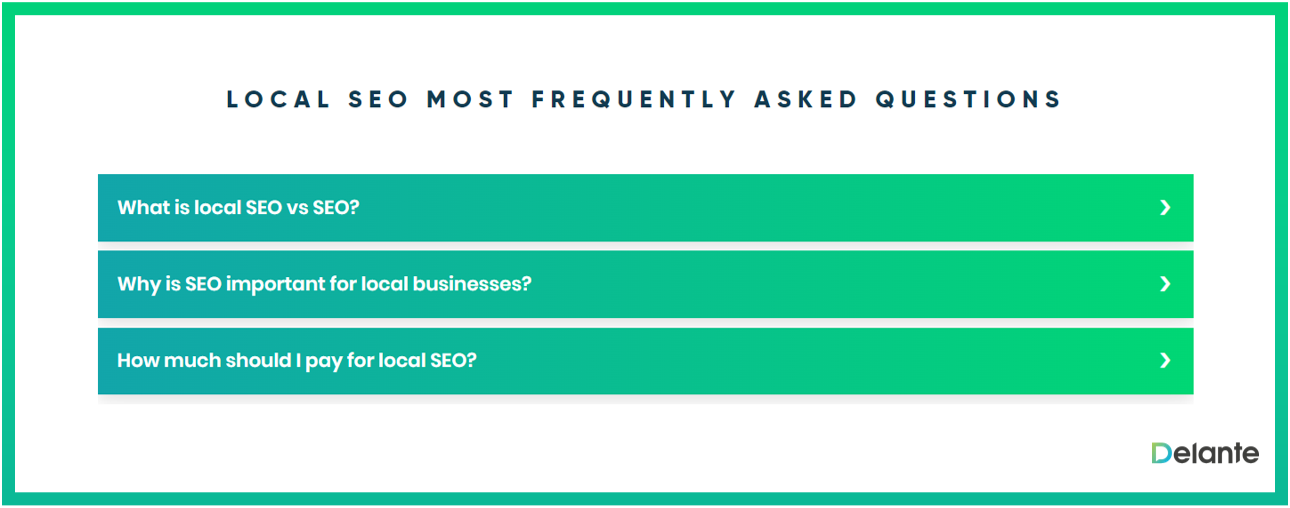Table of contents:
 Apart from that, you can analyze comments, inquiries, and questions asked by your customers. If you notice that a few users ask about the same thing, it might be a sign that it’s worth creating a FAQ section with answers to these questions.
Apart from that, you can analyze comments, inquiries, and questions asked by your customers. If you notice that a few users ask about the same thing, it might be a sign that it’s worth creating a FAQ section with answers to these questions.
 This way, your page can rank for more keywords and potential customers, who have similar doubts and try to find necessary information online, may come to your website.
When doing keyword research basics, you don’t have to always rely on tools. Try to put yourself into customers’ shoes and brainstorm content ideas.
This way, your page can rank for more keywords and potential customers, who have similar doubts and try to find necessary information online, may come to your website.
When doing keyword research basics, you don’t have to always rely on tools. Try to put yourself into customers’ shoes and brainstorm content ideas.
- What Is Keyword Research in SEO?
- Why Is Keyword Research Important?
- What Are the 4 Types of Keywords?
- How Do You Do Keyword Research for Beginners?
- Basics of Keyword Research - How to Choose the Best Keywords?
- What Makes a Good Keyword?
- I’ve Got My Keywords - Now What?
- Keyword Research Basics - The Takeaway
What Is Keyword Research in SEO?
Keyword research basics is the process of searching, choosing, and analyzing business-related phrases you want to be displayed in the search results. Keyword research should begin with an in-depth analysis of a given website. Taking the time to analyze the page content and business profile thoroughly pays off. See what makes your site stand out from the crowd, analyze product or service pages, categories, and other elements such as glossaries, or blogs. Then try to come up with keywords that describe each page best. Keyword research is one of the first steps of every SEO process. This is where everything begins. Once you have the keywords, you can proceed to other activities like e.g., content optimization, or link building.Why Is Keyword Research Important?
Are you wondering why you should focus on this element? Proper keyword strategy is the cornerstone of every SEO process, and it’s essential to increase organic website traffic and conversions. Moreover, the phrases you choose for the process will have a decisive impact on your business growth, organic visibility, rankings, and competitiveness.
Thanks to keyword research, you’ll be able to understand users better, tailor your content strategy to the target audience and decrease the bounce rate by providing potential customers with content, products, or services they’re looking for.
What Are the 4 Types of Keywords?
Wondering how to find the right keywords? To do it, first, you should realize that there are different types of keywords that correspond to specific search intents, and users’ needs. It’s possible to distinguish the following types of Google search keywords:Generic Keywords
Generic keywords consist of one or maximally two words. Typically, they’re used by people who aren’t ready to make a purchase yet and aren’t sure what they’re actually looking for. For example, when searching for pants, those users simply google “pants” or “women’s pants”. General keywords are extremely competitive and it’s usually hard to rank high for them. Choosing them for your SEO process requires a lot of patience, and you shouldn’t expect effects quickly. Moreover, such phrases usually generate lots of traffic, while having a relatively low conversion rate.Long Tail Keywords
Long tail keywords consist of two or more words. They are more detailed than the general keywords. Such keywords are typed in by users who know exactly what they’re looking for. Examples of long tails are “black jeans pants for men”, or “midi red wedding dress for women”. Long tail keywords are less competitive, which makes the SEO process easier and helps to achieve the first effects much quicker. Although they don’t generate so much traffic, the conversion rate is usually high. Statistically speaking, users can search for one product in six different ways, therefore, choosing long tail phrases for the SEO process is a recipe for attracting traffic that translates into sales.
Find out more about long tail SEO!
Brand Keywords
Brand keywords include the name of a given company or website. They help to build brand recognition and awareness. Examples of such phrases would include “local SEO Delante”, or “black jeans pants Zara”. If you see that an increasing number of users reach your page by entering brand keywords into the search engine, it’s a good sign. This type of keyword supports conversions and is affected by elements like SEO, employer branding, ePR, and marketing.Local Keywords
Local keywords include the names of specific cities, areas, or geographical regions. They can be used by the vast majority of businesses, and are extremely important for companies that operate mainly locally. Typically, local keywords are less competitive, and users googling them are more likely to convert. It’s worth noting that the structure of local keywords varies from country to country. For example, users in the USA use phrases like [service or product name] + “near me”, people in Germany simply google [service or product name] + “kaufen”, whereas users in the EU type in [service or product name] + city name. If you want to do local SEO, you should first analyze the market. To make your activities more effective, it’s advisable to use NAPs and citations. You should also make sure that your business is displayed in Google Maps, and that your content is optimized for relevant location-related keywords.
Want to learn more about keywords? Check out: 9 types of keywords in SEO you should consider.
How Do You Do Keyword Research for Beginners?
So, how do you do keyword research for beginners? The entire process starts with the analysis of phrases your website is already ranked for. For this purpose, you should have access to tools such as Google Search Console (it allows you to check how users access your website now, and what pages are the most popular), Ubersuggest, KeywordTool.io, Google Keyword Planner, or SEMrush and Ahrefs (that can be used to see what keywords your competitors rank for). What are these keyword research tools? They’re tools that will provide you with necessary data concerning your website, visibility, links, and traffic. Moreover, they’re also a great source of information about your market rivals, their content, backlinks, and so on. Although it’s possible to analyze some of the above-mentioned page elements manually, it would be much more time-consuming. So, using keyword research tools will allow you to save a lot of time and energy. Find out more about the most useful keyword research tools! You don’t have access to paid tools? Don’t worry! Google is a great source of inspiration. Just type in keywords related to your website and check the People also ask and Related searches sections. Then, choose topics and keywords that correspond to your content. Apart from that, you can analyze comments, inquiries, and questions asked by your customers. If you notice that a few users ask about the same thing, it might be a sign that it’s worth creating a FAQ section with answers to these questions.
Apart from that, you can analyze comments, inquiries, and questions asked by your customers. If you notice that a few users ask about the same thing, it might be a sign that it’s worth creating a FAQ section with answers to these questions.
 This way, your page can rank for more keywords and potential customers, who have similar doubts and try to find necessary information online, may come to your website.
When doing keyword research basics, you don’t have to always rely on tools. Try to put yourself into customers’ shoes and brainstorm content ideas.
This way, your page can rank for more keywords and potential customers, who have similar doubts and try to find necessary information online, may come to your website.
When doing keyword research basics, you don’t have to always rely on tools. Try to put yourself into customers’ shoes and brainstorm content ideas.
- What types of articles may be helpful for potential buyers?
- How can you present your offer and target users at different stages of the sales funnel?
- What types of keywords and topics can help you reach people who are ready to make a purchase?
- What articles can attract those who haven’t made up their minds yet, and are looking for information?
Read our article to learn more about researching blog content topics and tools that can help you do it.
Basics of Keyword Research - How to Choose the Best Keywords?
How to choose the right keywords?- From the list of keywords you’ve selected using the above-mentioned tools, choose the ones that correspond to your business profile and objectives.
- Analyze your keywords with keyword research tools (Ahrefs, SEMrush, or simply Google) to determine their search volume, competitiveness, difficulty, as well as content that ranks best.
- Analyze your competitors (either manually or with the use of the tools) to prepare a keyword gap analysis and find keywords that have great SEO potential.
- Make the best choice for your business. If you’ve just started your online activity or your company and your budget is rather small, don’t focus on highly competitive, generic keywords with enormous search volumes. Why? Because you won’t be able to compete with market tycoons.
What Makes a Good Keyword?
To ensure that you select phrases that are right for your business, and will support the SEO process, you should pay attention to elements such as:Search Intent
Think about the objectives of your potential customers and users visiting your page. What type of content do they expect to see? If someone googles purely informative keywords like “what is central processing unit”, and reaches a product page of an online store selling CPUs, they’ll probably leave your page, increasing the bounce rate. Don’t try to fool users, and give them content that corresponds to specific search intent types.Search Volume
Keyword volume is a number that indicates how many times a given phrase has been searched for by users within a month. Apart from looking at the number itself, you should also analyze the conversion, and difficulty (meaning how hard it’s going to be to rank for a specific keyword). Don’t try to bite more than you can chew and tailor your keywords to your possibilities, and SEO budget.I’ve Got My Keywords - Now What?
Once you have the keywords selected, it’s time to move on to saturating your website with the right phrases. Make sure that you use keywords in:- website titles,
- meta descriptions,
- headers (especially H1 and H2 ones),
- image alt texts,
- names of images posted on the site,
- anchor texts,
- blog articles,
- and URLs.
How many keywords should you use? Find out in our article about the best number of keywords for SEO.




![How to Create an Ad That Will STAND Out? + [VIDEO]](jpg/how-to-create-ads-that-stand-out.jpg)









